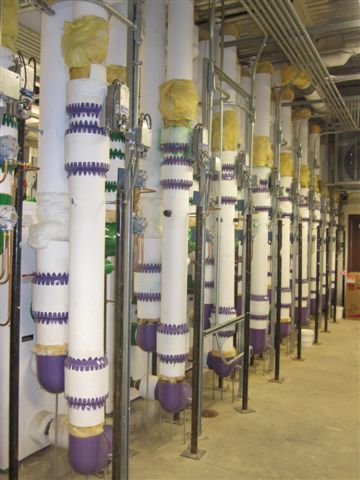
Geothermal systems use the natural constant temperature of the earth
to heat during the heating season and cool during the summer months. They
utilize a heat pump unit, a fluid heat exchanger, and an air delivery
system. Simply put, a geothermal system during heating takes heat from
the earth, transfers it to a refrigerant and distributes the heat into
a building with a forced-air or hydronic system. For cooling, the systems
takes heat from the building, transfers the heat to the refrigerant, and
the transfers the heat back to the water or loop fluid. While this is
similar to a standard air conditioner, the geothermal system uses water
or loop fluid at an average temperature (usually 50 degrees) rather that
changeable outdoor temperatures.
Factors to consider when comparing systems
CLIMATE
Areas with hot summers and large air conditioning requirements
find the systems more advantageous.
FACILITY DESIGN
Geothermal systems are most economical when incorporated
into initial facility design.
LAND AREA
Geothermal systems require piping systems to run horizontally
and vertically around the facility.
COST OF ALTERNATIVES
Conventional fossil fuel systems are affected by the rising
cost of natural gas, fuel oil and electricity.
ENERGY EFFICIENCY OF THE BUILDING
Like other systems, geothermal heat pumps work best in
an insulated, well sealed building.
ADVANTAGES
Competitive first costs compared to conventional system
Benefit from simultaneous heating & cooling
Promotes LEED/Sustainable/ Green Compliance
Inherent energy recovery
Eliminates underground steam piping
Improves comfort & indoor air quality
Eliminates multiple fuel sources
Packaged refrigeration equipment
High efficiency & stable capacity
Excellent life-cycle cost
Zoning of heat pumps permit individual room temperature
control
Can be applied to renovations or new construction
Smaller mechanical rooms
Simple controls & equipment
No cooling tower/chiller/ boilers
No outdoor or roof top equipment
Separate electrical meters allowed by Utility
Decentralized equipment prevents single unit failure from
shutting down the entire building
Heat pumps are generally small and easily repaired – no
special licenses needed
Low maintenance cost